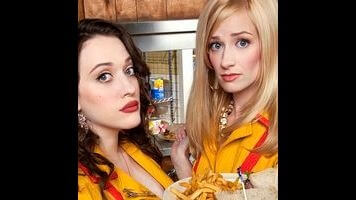2 Broke Girls: “And The Big Buttercream Breakthrough”

As the first season of 2 Broke Girls draws to a close, I find myself wondering just what it was about the show that made me so hopeful for it back in the early days. (Join me in season finale week, when I revisit the show’s pilot and see if I can rekindle some of that love!) Most of the problems—weird story construction, stereotypical characters, bad jokes—that have bedeviled the show have been there from the very beginning, though I will certainly say they’ve gotten worse as the season has gone along and the show hasn’t bothered to diversify its rhythms at all. (Tonight’s episode? Yet another tale of why Max and Caroline have such trouble trusting each other and being friends, as if we hadn’t already thought about that 21 times before.) Thinking specifically about tonight’s episode, I’d add to that that the show has always been “too busy,” only now getting rid of elements of it that didn’t really work. I’m assuming that tonight’s episode bids adieu to Peach for the foreseeable—like the show got rid of the horse back in the day—and that’s a good thing for the show’s long-term future.
The more I look at those elements, however, the more I realize why 2 Broke Girls fooled me back in the day: It’s basically Taxi! Taxi is, hands-down, one of my favorite shows ever made, and the rare multi-camera sitcom that was genuinely ahead of its time. Its dark stories, depressing milieu, and surrealist streak were all greeted with borderline puzzlement in the late ‘70s, but now, they’d fit right in in a schedule featuring tons of shows inspired by the original. Taxi was sort of the Arrested Development or Community of its day, though it had one hugely-rated, top-10 season. After that first season, however, it quickly sank in the ratings, and it was mostly kept on the air by critical acclaim and a march toward syndication numbers. (Studio Paramount shopped the show to NBC to get a fifth season that would put the show over the 100 episode hump. That season was the worst rated of all.) But the show possessed arguably the best sitcom ensemble of all time—Judd Hirsch! Danny DeVito! Christopher Lloyd! Andy Kaufman! Marilu Henner! Carol Kane! Tony Danza?—and intelligent scripts filled with great jokes. It’s a classic, and it’s a shame it’s so hard to see nowadays.
But Taxi was also a show about down-on-their-luck working class people living in New York. It split its time fairly equally between a grungy central location and with the various cabbies out on their adventures. It had at least one broad, ethnic stereotype in Kaufman’s Latka Gravas (and added a second one in the later seasons, when Kane came on board as Latka’s wife, Simka), and the humor was shot through with a mordant sense that things would never get any better. In addition, it was often a touch too cluttered, with at least one of the cabbie’s long-term career arcs getting shunted to the background with every new season. These were all people who dreamed of big things, but the show seemed resolute in stomping all over those dreams.
When I outline it like that, I hope you can see just why I had hopes that 2 Broke Girls might be vaguely similar to the earlier show. The obvious exception that was evident even from the pilots of both shows (and the pilot for Taxi is pretty rough) is the fact that the ensemble for Taxi is much, much stronger on the whole (though Lloyd wasn’t present in that first season). But at the same time, the two shows had such similar setups, even from the point-of-view of the timeslot they were in, that I had looked for some of that same creativity in 2 Broke Girls. And it was there in the early episodes! As the show started to make the neighborhood around the diner more of a character and tossed in some truly dark weirdness, it felt like a series that was coalescing around something fascinating and odd, something fueled as much by Occupy Wall Street as it was by dick jokes. Not everything worked, but the show was trying, at least.
 Keep scrolling for more great stories.
Keep scrolling for more great stories.
